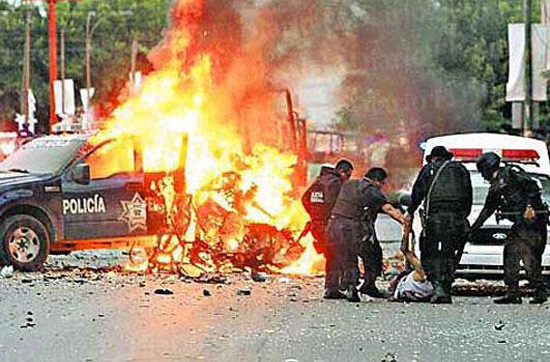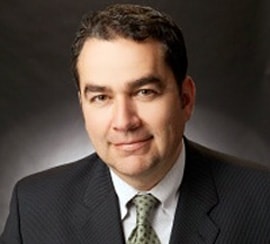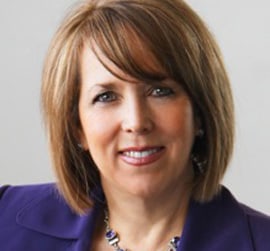
This photo shows the Juárez Cartel detonating a car bomb in Cuidád Juarez, Mexico, less than a mile from the U.S. border, last year. (Department of Homeland Security photo)
Reducing demand for illegal drugs in the United States, enacting comprehensive immigration reform and supporting Mexico’s efforts to fight drug cartels are among the proposals the Democratic 1st Congressional District candidates shared to address the crisis created by Mexico’s drug war.
This post continues a series on the U.S. Senate and 1st Congressional District candidates’ stances on various policy issues.
To address the crisis created by Mexico’s drug war, Eric Griego says the United States must work to eliminate the demand for drugs at home; Michelle Lujan Grisham agrees and says the United States must do more to keep its borders safe and help Mexico; Marty Chávez says the United States needs immigration reform pledges to work to find other solutions.
Griego, a Democratic candidate for New Mexico’s 1st Congressional District seat in the U.S. House, said the United States must “work closely with Mexico to stop traffickers and strengthen our border,” but said “we cannot effectively combat the continuing drug trafficking and violence across the border with just guns and fences.”
“The root cause of drug trafficking across the border into the U.S. is simple: Americans buy them, and there is much profit for drug cartels in ensuring supply,” Griego said. “And the gruesome violence in places such as Ciudád Juárez will continue as long as competing cartels continue to fight each other – and the Mexican military – to control smuggling operations to meet the drug demand in the U.S.”
Lujan Grisham, one of two other Democrats seeking the 1st District seat, said she supports Mexico’s efforts to “aggressively fight drug cartels and promote the rule of law,” but also said the United States must do more, including reducing drug demand in America by investing in education, drug prevention and drug-treatment programs.
She said the United States should also crack down on the illegal smuggling of weapons into Mexico, more aggressively encourage economic development along the border on both sides, and enact comprehensive immigration reform.
“The brutal violence perpetrated by the drug cartels should be attacked on all fronts,” Lujan Grisham said.
Chávez, the third 1st District candidate, said he would work “closely with local, state and federal agencies as well as international authorities to help end the bloodshed and find solutions to the systemic economic and social issues that drive the violence.” He also talked about immigration reform.
“Our immigration system is broken, and fixing it is vital to our national and economic security,” Chávez said. “Reform must be comprehensive and provide for tough border protection and employer sanctions, be fair to American taxpayers and be practical to maximize the effectiveness in restoring the rule of law.”
Chávez said he supports letting those undocumented immigrants who are already in the United States earn a path to citizenship “by getting in the back of the immigration line, learning English, paying taxes, passing a criminal background check and paying fines and/or penalties.”
The question
The Democratic 1st Congressional District candidates made their comments in response to a question from NMPolitics.net about Mexico’s drug war. NMPolitics.net gave them no word minimum or limit, telling them to say what they had to say. The only criterion was that they not engage in personal attacks.
Here’s the question NMPolitics.net asked:
- Mexico’s drug war hasn’t gotten as much attention in the United States as conflicts in some other foreign nations, but it’s been a destabilizing force in New Mexico’s neighbor – whose economy is arguably intertwined with that of the United States – and has had a tangible impact in the United States, with cartels operating in many states and some documented instances of spillover violence in Southern New Mexico and elsewhere. That’s on top of the humanitarian crisis the war has created in areas of Mexico including our neighbor, Cuidád Juarez. What policies and action do you support to address the crisis?
Their responses, published in their entirety:

Eric Griego (Courtesy photo)
Eric Griego
“For decades, America has spent billions of dollars to provide weapons, training and intelligence services to the Mexican government to clamp down on drug cartels within their border. That does not include the billions we spend to build and maintain border fences and hire patrols to keep drugs and their traffickers out. While we must continue to work closely with Mexico to stop traffickers and strengthen our border, we cannot effectively combat the continuing drug trafficking and violence across the border with just guns and fences. We must do a better job in eliminating demand for drugs within our own border.
“The root cause of drug trafficking across the border into the U.S. is simple: Americans buy them, and there is much profit for drug cartels in ensuring supply. And the gruesome violence in places such as Ciudád Juárez will continue as long as competing cartels continue to fight each other – and the Mexican military – to control smuggling operations to meet the drug demand in the U.S.
“Billions of taxpayer dollars are spent each year in the U.S. on arrests and incarceration of drug users, leading to overcrowded prisons and a huge drain on budgets. And too often, these drug users return to their addiction once they are released from incarceration because their addiction is not treated in prison. The result is a costly perpetuation of drug abuse, arrest and imprisonment. That is why I believe we need to invest more in drug treatment and prevention, especially for non-violent drug crimes.
“We also need to be working at the highest levels with Mexican officials to address the underlying economic and social causes of the boom in the Mexican drug trade. We should increase aid not just for interdiction and border cooperation, but for joint work on trade and economic cooperation between our two countries. Unless Mexicans have viable economic opportunities, then the illicit and underground economies will continue to thrive.
“Mexico must also step up and do its part. While the Mexican military’s crackdown on the drug cartels appears to have had some temporary effect in reducing homicides in drug havens such as Ciudád Juárez, that is not a long-term strategy. Mexico, with U.S. help, must professionalize and rebuild its civilian law enforcement forces to eliminate civil corruption, and maintain security and rebuild public confidence. Mexico must also improve economic conditions for its citizens to stop the cartels’ ability to recruit local sympathizers to complicate law enforcement capabilities. Otherwise, for individuals and communities with little or no economic opportunities, the manufacture, transport and distribution of illicit drugs will remain a viable trade.
“As our neighbor and one of our largest trading partners, we cannot ask Mexico to go it alone. This is an important bilateral relationship we need to spend some real time deepening. It is truly in our mutual national interest.”

Michelle Lujan Grisham (Courtesy photo)
Michelle Lujan Grisham
“We have an opportunity with the upcoming presidential election in Mexico to pursue more direct engagement that promotes the interests of the United States, while encouraging popular support for reform within the country. Mexico will not be able to effectively move forward without addressing government corruption and loosening the grip of government monopolies that stifle economic growth.
“I support our current foreign policy that backs Mexico’s efforts to aggressively fight drug cartels and promote the rule of law. The brutal violence perpetrated by the drug cartels should be attacked on all fronts.
“At the same time, we must do more on our end to keep our borders safe and ensure that Mexico is stable and prosperous. First, we should consider a new approach to reduce the demand for drugs, which will require an investment in education, drug prevention and drug rehabilitation programs. Second, we must crack down on the illegal smuggling of guns to Mexico. Third, we need a more aggressive strategy to encourage economic development at the border – and on both sides of the border. Our labor markets are integrated, and we should take advantage of that. Finally, we need to finally address comprehensive immigration reform, which requires Congress to make it a priority. I will provide that leadership in Congress.”

Marty Chávez (Courtesy photo)
Marty Chávez
“I strongly condemn the drug-related violence that has plagued communities on both sides of our border. In Congress, I will work closely with local, state and federal agencies as well as international authorities to help end the bloodshed and find solutions to the systemic economic and social issues that drive the violence.
“Our immigration system is broken, and fixing it is vital to our national and economic security. Reform must be comprehensive and provide for tough border protection and employer sanctions, be fair to American taxpayers and be practical to maximize the effectiveness in restoring the rule of law. It’s not possible to throw a net around 13 million people, and I support letting those already living in the United States earn a path to citizenship by getting in the back of the immigration line, learning English, paying taxes, passing a criminal background check and paying fines and/or penalties.
“Among all candidates running for Congress I am uniquely qualified to deal with these issues on a national level.
“As a law student, I co-founded “Centro de Immigracion,” a national clearinghouse of immigration writings, and as mayor of Albuquerque, I took full advantage of our sister city relationships with both Guadalajara and Chihuahua for exchanges in business, education, and cultural areas.
“I have also represented the United States as part of the delegation to Mexican President Ernesto Zedillo’s inauguration and participated in trade missions to Mexico City with Mexican President Vicente Fox.”